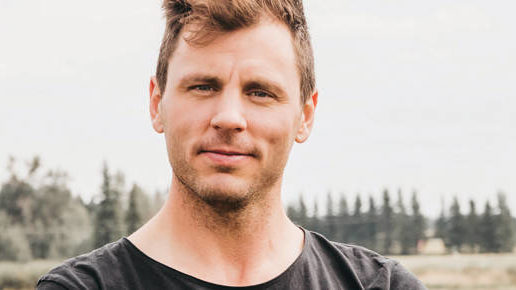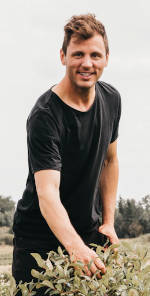
Alberta agri-entrepreneur, Andrew Rosychuk’s journey to becoming a Nuffield Scholar (see sidebar on Page 11) centres around an exceptional little fruit he believes more of the world needs to taste — the haskap berry.
A quick Internet search will net you a wide swath of information about this berry, from its unusual look and taste to its native northern climates and its many health benefits.

Andrew Rosychuk, a 2020 Nuffield Scholar, grows haskap berries on his farm in the hamlet of Alcomdale, AB, located about 30 km northwest of Edmonton
But to really capture its essence, you need to talk with a grower like Rosychuk, who is passionate about sharing the berry. “Selling fresh fruit to people and (seeing) their first experience tasting a haskap is super amazing,” says Rosychuk, who revels in challenging Farmer’s Market tasters to describe the flavour.
“In many ways, I call it a better blueberry. Whatever a blueberry can do, a haskap can do as well,” he says. “The intensity of flavour transfers really well to food, and the nutraceutical side of things is through the roof. And it grows in our backyard,” explains Rosychuk.
“So it’s a combination of many things that make it a potentially high-value, very viable crop. I got into it because, how many people have the opportunity to work with a brandnew fruit?”
But as his own vision has grown, this self-described “city slicker turned farmer” is looking for ways to do more than just grow the berries at his Alcomdale, AB, farm, which is why his Nuffield area of study will look at the value of developing on-farm, medium-scale processing.
Creating a Business
Rosychuk was destined for this. As a child, he took notes while watching his favourite TV show, The Canadian Gardener, and, at the tender age of 12, became the neighbourhood plant guru in his Edmonton community.
While taking the Production Horticulture program at Olds College, Rosychuk started to evaluate realistic opportunities for a young producer. “Within my first year I was really looking at options.”
Ruling out greenhouse production (too costly), tree farming (too intensive) and vegetables (too diverse), Rosychuk narrowed down the field to fruit production. He began sizing up the choices, passing over options like saskatoons and black currants, opting to test drive sour cherries and haskaps on a two-acre plot between shelterbelts on the family farm where his father grew up, near Willingdon, northeast of Edmonton.
Making the Investment
The path to realizing a dream is rarely a straight one and, for Rosychuk, that meant a self-imposed detour — working for Suncor in Fort McMurray. “I knew you needed money to make money, and I wasn’t going to be able to do it any other way,” he says. “If it wasn’t for boiler-making, there’s no way I could do what I’m doing.”
In 2014, with some earned capital and a lot of research, Rosychuk searched for a home base, eventually finding 80 acres at Alcomdale, north of Edmonton, which he could afford and he felt would be a good fit for the haskaps. Next came reclaiming the “tired” soil, crafting a business plan, then planting his orchard, Rosy Farms, which now boasts 27,000 plants on 27 acres.
He connected with the University of Saskatchewan’s Fruit Program (which originated the Boreal series of haskap varieties) and fruit breeder, Bob Bors. These connections resulted in varietal improvement with better fruit and bushes more suited to mechanical harvesting.
Building a Network
With a vision far beyond his own enterprise, Rosychuk has invested time to set up the Haskap Alberta Association. He’s also a founding shareholder and board member of North 49 Fruit Corporation, which represents nearly a dozen growers across Canada focused on bringing haskaps to the marketplace. It’s already had success domestically, selling the fruit to ice cream manufacturers, and wholesale through Sysco Canada.
“We have this amazing topping, which is like a low-sugar jam, and then we have individually quick frozen (IQF) fruit,” he says. “We’re developing that market, and we’re hoping to launch a brand new product line this fall. That’s where we see the future of (haskaps) — as an everyday fruit.”
The Promise and Drawbacks of On-Farm Processing
But is there enough farm gate cash from just producing the berries? Where is the point of diminishing returns when it comes to investing in processing, marketing and distribution? Those are the big picture questions Rosychuk is grappling with now, and why his Nuffield studies will centre on medium-scale processing.
Historically, farmers seem to come second place, he says. “It’s the intermediaries, the middlemen, the brokers, the processors, the distributors and the sellers that make all the money,” explains Rosychuck. “So I thought, if I can create value, and shrink that value chain on my own farm, that would be really good. What has evolved since then is that processing is expensive, especially when you get into food safety.”
So what’s a haskap grower to do? Rosychuk has some thoughts: “It’s being able to take a raw product into an ingredient style, not a finished product, because that’s a whole different beast.”
But there are still questions. “When you do value-add, does it really add value? As you go through the steps, is that something you should be doing on your own, or should you be getting someone else to do it?” Finding that sweet spot along the value chain is no easy challenge and that’s where his Nuffield work will come in.
Urged to consider applying for the Nuffield program by his friend and 2011 scholar, Leona (Dargis) Watson, Rosychuk is excited about the “new tribe” he’s found. “This really is an international collaboration,” he says. “You meet these people and all they want to do is share. In this day and age, really, everything’s been done. You’ve just got to find the person that’s already done it. It opens us up to some very powerful farmers and past scholars, where you can just call them up and say, ‘Hey, can I please learn from you?'”
The Nuffield international conference was underway in Tangalooma Island in Queensland, Australia in March when COVID-19 began to lock down the world. What was supposed to be a three-week session was reduced to five days, as everyone rushed to get home.
The Nuffield organization has adjusted timelines to accommodate scholars who rely on travel for study and research. “We don’t really know what to expect, but we do know when it does open up, there will be a couch to sleep on somewhere around the world to learn about something cool.”
Along with the valuable help of his family, he’s going into year five of haskap production at Rosy Farms, adding a harvester and a freezer to his operation, and working on his tracking processes for food safety. He plans to freeze some berries this year as a first foray into processing.
“My end game is, I really want to be a farm manager for numerous places, to then build value for the farmer who’s growing the crop, but also for me to be a part of it, and be a builder of the industry. It should be an everyday fruit.” FF
Nuffield Canada Agricultural Scholarships
The Canadian Nuffield Agricultural Scholarship Association seeks interested people who want to challenge themselves in a program of international travel and study, to add value to Canadian agriculture as well as to their own careers. Canada has awarded 108 scholarships since 1950, with studies covering a broad range of agricultural topics.
The program is part of an international effort that goes back to Lord Nuffield (William Morris), who was born near Worcester, England in 1877. Nuffield, grandson of a farmer, was a lifelong learner and dedicated his life to seeking best practices in his work.
He became a successful industrialist and philanthropist, and in 1943 established the Nuffield Foundation for agricultural advancement, which led to the establishment of parallel groups around the world.
Each year Nuffield Canada awards numerous scholarships, each $15,000 to individuals with a passion for agriculture. The scholarship requires the recipient to travel for a minimum of 10 weeks, within 24 months, for the purposes of study.
Want to learn more about haskaps? Check out these sites:
Rosy Farms
www.farmforum.ca/rosyfarms
Haskap Alberta Association
www.farmforum.ca/haskapalberta
Haskap Canada Association
www.farmforum.ca/haskapcanada
North 49 Fruit Corporation
www.farmforum.ca/north49fruit
University of Saskatchewan Fruit Program
www.farmforum.ca/UofSfruitprogram
2020 Nuffield Scholars
Andrew Rosychuk is one of four Nuffield Canada scholarship recipients for 2020. Meet the other three Nuffield Scholars:
Amy Cronin
Bluevale, ON
Grain Farmers of Ontario Scholarship Recipient
A passionate leader, advocate and mother of six, Amy Cronin has already created waves within the agricultural landscape. She and her husband, Mike, farm in Ontario, Iowa, and Missouri as hog and cash crop producers. Amy plans to take a comprehensive look at the risk management strategies implemented by successful farm businesses, agricultural industries and governments around the world.
Jodi Souter
Saskatoon, SK
Canadian Canola Growers Association Scholarship Recipient
An accomplished and motivated scientist, Jodi Souter is an independent plant breeder. She plans to learn more about the progress and limitations surrounding crop development in varying political environments. She will learn about opportunities enabled by the Plant Breeders Rights Act and hopes to promote innovations in the development of cuttingedge varieties to enable farmers to be more competitive in the global market.
Dawn Trautman
Edmonton, AB
Alberta Wheat Commission Scholarship Recipient
Dawn Trautman is a manager of Smart Agriculture and Food Innovation with Alberta Innovates. As an agricultural economist with a BSc in Biological Sciences and a MSc in Agricultural and Resource Economics, Dawn plans to study the barriers for Smart Agriculture adoption for producers while also expanding on opportunities for technology companies to develop and integrate made-in-Canada solutions for sustainable production.